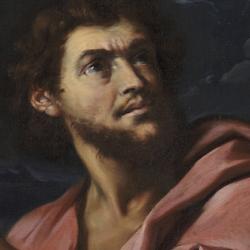Mahood again ( The Merchant of Venice (The New Cambridge Shakespeare) ), describing Shakespeare’s and Shylock’s use of the gospels in the play (p. 198-9).
“On Shylock’s first meeting with Bassanio, his detestation of the Christians breaks out in the dactylic rhythm and harsh consonants of ’ to eat of the habitation which your prophet the Nazarite conjured the devil into’: a phrase of virulent contempt which must have startled early audiences and indeed so shocked Johnson that he omitted it from his edition. Nowadays it falls short of this effect, since only a portion of the audience realise that Shylock’s words travesty the Gospel narrative about Jesus miraculously healing two demented men . . . .
“Shakespeare could, however, count on his audience knowing the sayings of Jesus thoroughly, and elsewhere he manipulates their knowledge to achieve sharp dramatic irony at Shylock’s expense. When Shylock calls Antonio ‘a fawning publican,’ Shakespeare may intend him to be suggesting that Antonio is a lackey of the people in power; but he certainly intends the audience to recall and to attribute to Shylock the self-righteousness of the Pharisee when, in the Gospel parable, he dissociates himself from the publican. ‘The curse never fell upon our nation till now’ had specific meaning for an audience that remembered Jesus’s prophecy over Jerusalem – ’ Behold your habitation shall be left to you desolate ’ – and thought of the Diaspora as retribution upon the Jews who had elected to save Barabbas and let Jesus be crucified : another part of the Gospel story recalled in Shylock’s wish that ‘any of the stock of Barabbas’ had been Jessica’s husband, rather than a Christian.”
It’s worth noting that none of these gospel allusions plays to Shylock’s advantage. If Antonio is a publican, Shylock is the Pharisee, who does not go to his house justified. Shylock’s house is left desolate, like the house of first-century Jews. This is another line of evidence that Shakespeare intended Shylock to be the villain of the play – a rounded, real and human villain, but a villain nonetheless.











